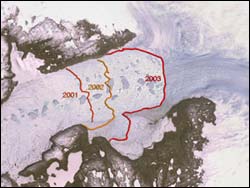
Around the world, seagrass beds – shallow-water ecosystems that are important habitats, food sources, and sediment stabilizers – are in decline, says Frederick Short, research professor of natural resources and marine science at the University of New Hampshire. And as these underwater meadows disappear, so do commercially valuable shellfish and fish, waterfowl and other wildlife, water quality, and erosion prevention.
Short, who founded the global monitoring program SeagrassNet in 2001
For more than a decade space-based radar instruments have been routinely observing ocean surface phenomena including wind, waves, oil slicks, even the eyes of hurricanes. Now – employing the same principle as police speed guns – satellite radar has also begun to enable direct measurements of the speed of the moving ocean surface itself.
The oceans that cover 71% of the Earth’s surface are constantly in motion. Ocean surface currents can lead to strong interaction with wind and wa
Proposals by environmentalists to declare small areas of the North Sea as no-fishing zones would not save our flagging fish stocks, suggests a new report by Newcastle University for the British Government’s Department for Environment, Food and Rural Affairs. (DEFRA).
Marine protected areas (MPAs) would need to be tens of thousands of square miles in size – at least as big as the size of Wales – and would need to be established for decades to restore levels of cod and haddock, says the re
Finding leads to new conclusions about marine environment
New evidence from open-sea experiments shows there’s a constant shuffling of genetic material going on among the ocean’s tiny plankton. It happens via ocean-dwelling viruses, scientists report this week in the journal Science.
Conducted by biological oceanographers Sallie Chisholm and her colleagues at the Massachusetts Institute of Technology, the research is uncovering a new facet of evolution and helpi
Scientists make progress toward understanding mysteries surrounding animals that live in the dark recesses of the oceans
The largest habitats on Earth are located in the vast, dark plains at the bottom of the ocean. Yet because of their remoteness, many aspects of this mostly unexplored world remain mysterious. New research led by Scripps Institution of Oceanography at the University of California, San Diego, has produced a rare insight into animal populations in the deep sea

Glaciers and ice sheets around the world have a big problem: warmer waters.
According to a NASA scientist, the pieces to a years-old scientific puzzle have come together to confirm warmer water temperatures are creeping into the Earth’s colder areas. Those warm waters are increasing melting and accelerating ice flow in polar areas.
This conclusion appears in an article by Robert Bindschadler, a glaciologist at NASA’s Goddard Space Flight Center in Greenbelt, Md. His arti